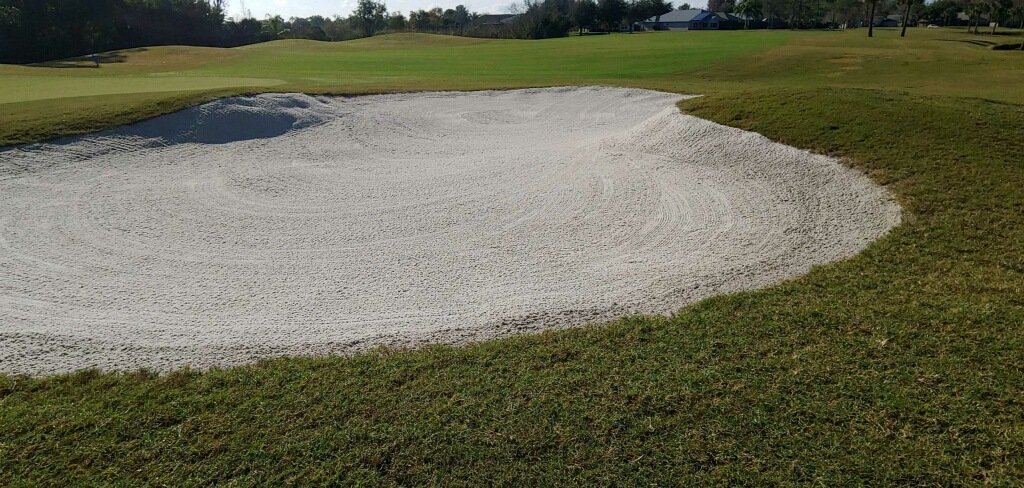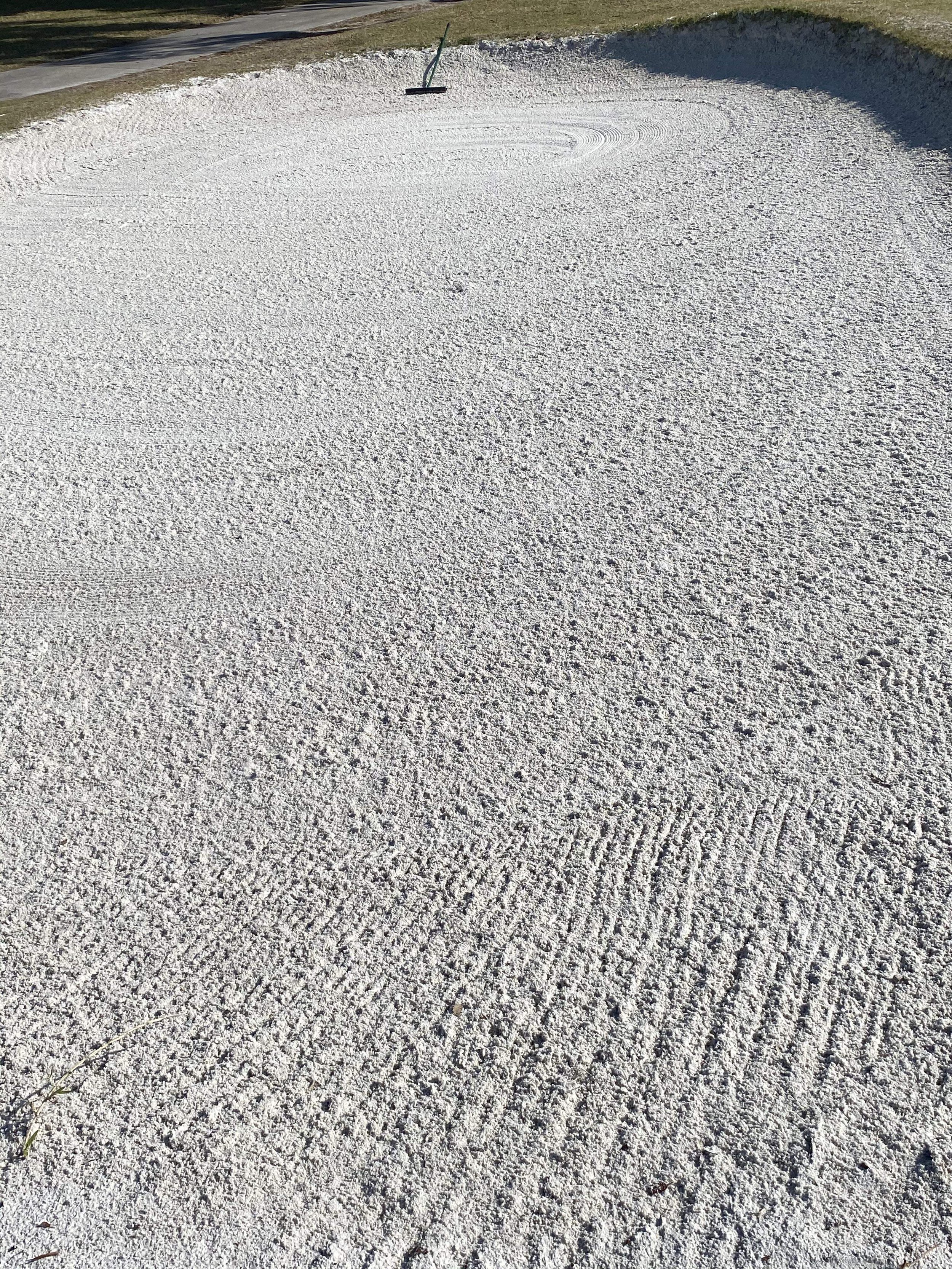Bunker raking is an essential maintenance practice for golf courses in Florida. It creates a consistent playing surface for golfers, enhances the course’s aesthetics, promotes turf health, and helps prevent player injuries. However, there are some possible disadvantages to consider as well. Bunker raking can be labor-intensive and costly. It can also have negative environmental impacts and create safety hazards if not done properly.
Bunker raking is a maintenance practice commonly used on golf courses to smooth the sand in bunkers and create a consistent playing surface. The process involves using a rake or specialized equipment to distribute the sand evenly and remove any debris or vegetation that may have accumulated in the bunker.
Advantages of Bunker Raking
1- Improves Playability

One of the primary advantages of bunker raking is the creation of a consistent playing surface for golfers. In Florida, where the climate and soil conditions can vary widely, maintaining bunkers becomes especially important to avoid any negative impact on a golfer’s shot.
Improperly raked sand can become compacted or uneven, making it difficult for golfers to control the ball. This can result in unpredictable shots and negatively affect the player’s overall experience.
Regular bunker raking by golf course staff ensures the uniform dispersion and proper flattening of the sand. This creates a consistent playing surface, allowing golfers to concentrate on their shots without worrying about unpredictable conditions.
2- Enhances Aesthetics
Bunkers serve as a significant visual element on any golf course, and a well-maintained bunker can enhance the overall beauty of the course. This aspect holds particular importance in Florida, where many courses boast stunning natural landscapes and scenic views.
When bunkers are not properly maintained, they can become overgrown with weeds or other plants, which significantly detracts from the course’s aesthetic appeal.
By regularly raking the bunkers and removing any debris or vegetation, golf course staff can ensure that the bunkers maintain their visual allure. This, in turn, contributes to an exceptional experience for golfers and helps attract new players to the course.
3- Promotes Turf Health
Another key benefit of bunker raking is its ability to promote turf health. When sand from bunkers spreads onto the grass, it can cause stress and weaken the turf, resulting in issues with disease, weeds, and pests. This becomes particularly challenging in Florida, where the combination of high temperatures and humidity intensifies turf stress.
By regularly raking bunkers and preventing sand encroachment onto the turf, golf course staff can effectively maintain healthy grass throughout the entire course. This, in turn, helps reduce the reliance on pesticides and other chemical treatments, thereby minimizing negative environmental impacts.
4- Prevents Injury
Finally, bunker raking plays a crucial role in preventing player injuries. In Florida, where many golf courses feature bunkers with steep slopes or deep sand, maintaining a smooth surface is essential to minimize the risk of players tripping or twisting their ankles. Improperly raked sand can accumulate in deep or unstable areas, making it challenging for golfers to safely climb out of bunkers.
By regularly raking bunkers and ensuring even distribution of sand, golf course staff can significantly reduce the risk of player injuries. This proactive approach contributes to a safer and more enjoyable playing experience for golfers.
Disadvantages of Bunker Raking
While bunker raking is an important maintenance practice for golf courses, it is essential to consider potential drawbacks. Here, we outline four key disadvantages of bunker raking in the context of Florida golf courses, along with their respective solutions.
1- Labor-Intensive

Problem: Bunker raking can be a labor-intensive task, particularly on larger courses with numerous bunkers. This challenge is particularly pronounced in Florida, where the climate can be hot and humid throughout much of the year. The physical demands of bunker raking can require staff to take additional breaks or rest periods to prevent injury or exhaustion.
Solution: To address this disadvantage, golf course staff can consider utilizing specialized equipment, such as bunker rakes or sand pro machines, to make the task more efficient and less physically demanding. Additionally, staff can prioritize bunker maintenance during cooler times of the day or during periods of lower player traffic, reducing the strain on the staff members involved in the raking process.
2- Costly
Problem: Bunker raking can be a costly endeavor, particularly for golf courses with a large number of bunkers. This challenge becomes even more pronounced in Florida, where high land values and property taxes can make it difficult to maintain a financially viable golf course. Alongside the staff time required, bunker raking necessitates ongoing maintenance of sand and other materials, as well as the use of specialized equipment.
Solution: To address this disadvantage, golf courses can consider exploring alternative options for bunker maintenance. This may include reducing the number of bunkers or transitioning to more naturalistic designs that require less maintenance. Additionally, courses can prioritize the efficient use of materials and explore cost-saving measures, such as purchasing sand in bulk or sourcing materials locally. These strategies can help mitigate the financial burden associated with bunker raking while ensuring the course’s overall maintenance.
3- Environmental Impact
Problem: Bunker raking can potentially have negative environmental impacts, especially when the sand used in the bunkers is not locally sourced or when significant amounts of sand are regularly added or replaced. This concern is particularly significant in Florida, where many golf courses are situated near delicate ecosystems, such as wetlands or coastal habitats. Bunker raking can contribute to issues such as erosion, water pollution, and other environmental challenges.
Solution: To address this disadvantage, golf courses can prioritize sustainable practices and actively seek out environmentally friendly materials for bunker maintenance. It is essential for courses to work collaboratively with environmental organizations or regulatory agencies to ensure compliance with best practices and minimize any detrimental effects on local ecosystems. By adopting these measures, courses can contribute to the preservation and protection of the surrounding environment.
4- Safety Hazards
Problem: Finally, improper bunker raking can pose safety hazards. In Florida, where many golf courses feature steeply sloped bunkers or deep sand, it is crucial to ensure that the sand is evenly spread and not piled up in unstable areas. Carelessly raked bunkers can also create risks for maintenance staff, who may be vulnerable to injuries while raking or moving heavy equipment.
Solution: To address this disadvantage, golf courses can prioritize safety training for their staff members, ensuring they are well-versed in proper bunker raking techniques. Additionally, it is important to regularly maintain and inspect all equipment used for bunker maintenance. Courses can also explore the use of specialized equipment, such as bunker rakes or sand pro machines, to minimize the risk of injuries or fatigue among staff members. By implementing these measures, courses can create a safer environment for both golfers and maintenance personnel.
Bunker raking holds significant importance in maintaining golf courses in Florida. However, it is crucial to consider the potential drawbacks associated with this practice. By prioritizing safety, sustainability, and efficiency, golf courses can effectively mitigate these disadvantages. This ensures a positive playing experience for golfers while also protecting the environment and maintaining a strong financial position.
Manage your golf course with DTE Golf®, your trusted provider of golf course services in Florida. Contact us today for a free consultation!
